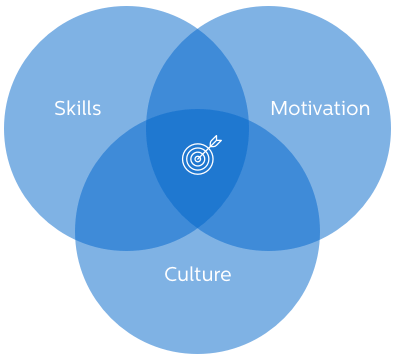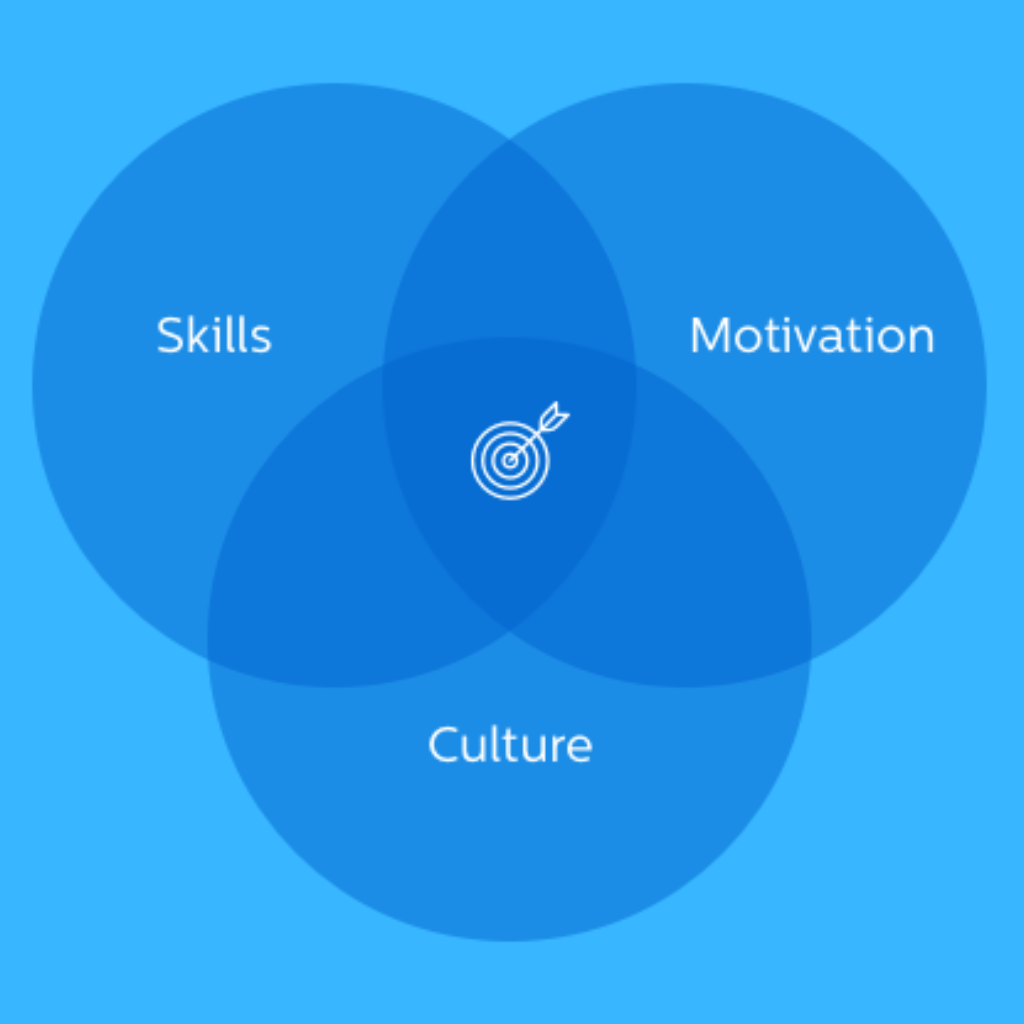Your skills fit will help align you to a specific role in a company, but your culture and your motivational fit are what determines the type of company that is right for you.
Focusing just on culture and motivating elements; let’s examine two different types of work environments to see which most appeals to you. Keep in mind that these are generalizations and that every company is different. You’ll need to research and observe individual companies to understand if they are a good fit on a case-by-case basis.
Comparing Work Cultures
Two organization types that provide a good contrast are corporate environments and startups. Below is a comparison of the two, highlighting some of the ways they differ, and the unique advantages of each organization. Take note of what appeals to you to figure out your best fit.
Established vs. Growth Potential
A corporate environment offers the comfort of an already up-and-running operation, name recognition, and a well-defined business model. If you want to jump into a game where everyone already knows the rules, and the expectations are clear, this is the place for you.
When you go to work at a startup, you know that you’ll be part of developing the business, building the product, and making a name for the company and yourself—through your own efforts. The organization may start small, but usually the goals are big. You’ll be expected to contribute and grow on-pace with the firm.
History vs. Innovation
When a company has a long history, it is easier to research and tell if the environment is going to be a good fit. Without too much work, you should be able to find the story of the organization, connect with people who’ve worked there, and read reviews of former and current employees online.
For startups, their story is still being written. And the great part is that you get to be a part of creating that story every day. You’ll need to be comfortable with ambiguity, trying new approaches, and unconventional thinking. This type of business only succeeds if it can differentiate itself from the competition. If you want to blend in, then this isn’t the right place for you.
Recognition vs. Stretch
 Need a job that allows you to get experience and has a little cache in your industry? Some career paths require that you have experience with one of the big players in the field before you can strike out on your own. It can be beneficial to learn from a business that has a proven track record.
Need a job that allows you to get experience and has a little cache in your industry? Some career paths require that you have experience with one of the big players in the field before you can strike out on your own. It can be beneficial to learn from a business that has a proven track record.
In a startup you’ll be expected to wear many hats, to accomplish big goals, and to do it all with little resources. In an environment like this you can gain a wide variety of experience in a short amount of time. This type of environment can be especially good for a person still narrowing down their long-term career path and looking to grow into their role.
Routine vs. Entrepreneurial Atmosphere
Once a business is well-established, it relies on its employees to deliver consistent results, using the company’s best practices and processes. If you want to be able to learn the rules of the game and establish a daily routine, this is a good environment for you.
If you are comfortable with the unknown, a little risk, and like working until the job’s done then a startup will provide you with opportunities to experience all three. If you are dreaming of starting your own company one day, this environment is a good way to practice the skills that will make you successful.
Structured vs. Flat Hierarchy
Defined roles, organizational charts, reporting structures, and charted out paths for career development, are all hallmarks of the corporate environment. This is a good environment if you want to know exactly where you fit, your trajectory, and who’s in charge.
Most startups have a flat organization made up of a team that works side-by-side (sometimes literally) to get objectives accomplished. If you care about titles, having the big office in the corner, or are used to having the comfort of a little seniority, then this organization will be hard to get used to.
Formal Training vs. Self-Directed Learning
Corporate entities usually have defined training programs. You’ll work through modules, get to know the company and the role well, and will have resources to aid you as you get to know the lay of the land. There’s a lot to learn when so many processes are already in place. This is a good fit if you like to work “by the book.”
There’s not any room for dead weight in a small company. Often, there is no formal training in this environment. Training might mainly consist of spending time with each member of the team to develop a quick understanding of what everyone needs from you. A perfect match if you like to learn on the fly, and develop your own processes.
Classic vs. Unconventional Benefits
For many people this area is one of the biggest draws of a corporate role. Large companies have great bargaining power to develop rich benefits at a lower cost. This can also be true at a government organization as well. Big organizations often have excellent:
- Healthcare benefits for the employee spouse/partner and dependents
- 401K partial contributions or matching
- Flexible Spending Accounts (FSA) that allow you to get part of your pay tax-free for use on health, wellness, and day care expenditures
- Other perks include: day care, wellness initiatives, cafeterias, assigned or covered parking, employee discount programs, charity matching or campaigns like the United Way, and organized volunteer opportunities (runs, walks, drives, or larger group projects like building a house for Habitat for Humanity)
Unconventional benefits are also a big reason why people seek out roles at startups. The benefits here are usually targeted at people without many health and family related concerns. The focus here is on autonomy, freedom, and work-life balance. Many startups have enhanced or additional perks, along with some or all of the classic benefits, like:
- Flex-time or the ability to work from home
- Lax dress codes and the freedom to modify your workspace
- Non-standard work environments, often open concept with team spaces
- Free food and drinks in the company break room
- And other truly unusual perks include: nap pods, paid-time to work on your own projects, sabbaticals, company libraries, ride share or other types of transportation discounts, and paid time to volunteer at your favorite charity
Contribution vs. Impact
Finally, one of the most exciting parts of working at a large company is the ability to be a part of something bigger. Your role and your efforts contribute to larger goals downstream.
Your daily work at a smaller startup can make a big impact on the outcomes for the company. You can build a resume full of results, participate in a myriad of different projects and see how your work directly impacts the organization’s success.
BONUS: Cultural & Motivational Fit Questions
Need help with figuring out what questions to ask yourself as you research and determine if a company is right for you? Here are some good questions to get you started:
- How do they develop talent?
- What is their guiding philosophy or mission?
- Do they live up to their mission and values?
- From their perspective, what makes a great employee?
- How do they invest in their employees?
- How do they give back to the community?
- When you go to their offices what impression do you get from the office, the interviewers, and the people who work there?

